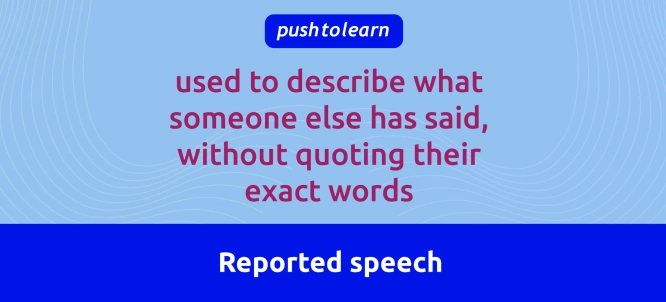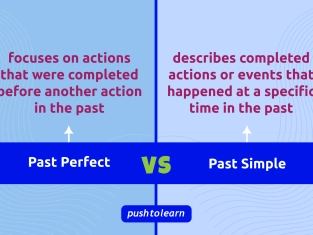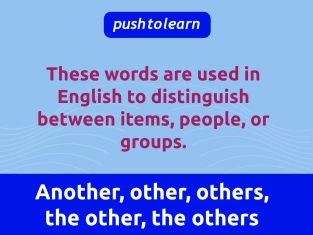by PushtoLearn
Reported Speech
Table of Contents
Reported Speech - Exercises
These exercises focus on Reported Speech
Key Features of Reported Speech
-
No Quotation Marks
In reported speech, you don’t use quotation marks because you’re not repeating the speaker’s exact words. -
Changes in Pronouns
The pronouns often change to match the perspective of the person reporting the speech. -
Backshifting Tenses
If the reporting verb (e.g., said, told) is in the past tense, the tense of the original statement usually shifts back one step in time. -
Time and Place Changes
Words like "today," "tomorrow," or "here" may need to change to match the time and place from the perspective of the reporter.

How to Form Reported Speech
-
Structure:
Reporting Verb + That (Optional) + Reported Clause -
Example: He said (that) he was tired.
-
Common Reporting Verbs:
-
Said, told, asked, explained, admitted, suggested, promised.
Examples of Tense Changes in Reported Speech
If the reporting verb is in the past tense, the tense in the reported clause usually shifts back:
|
Direct Speech |
Reported Speech |
|
Present Simple: "I work hard." |
Past Simple: He said he worked hard. |
|
Present Continuous: "I am working." |
Past Continuous: She said she was working. |
|
Past Simple: "I visited Paris." |
Past Perfect: He said he had visited Paris. |
|
Present Perfect: "I have finished." |
Past Perfect: She said she had finished. |
|
Will: "I will call you later." |
Would: He said he would call me later. |
Pronoun Changes in Reported Speech
Pronouns change based on the perspective of the reporter:
-
Direct Speech: "I am tired."
Reported Speech: She said she was tired. -
Direct Speech: "We will meet you tomorrow."
Reported Speech: They said they would meet me the next day.
Time and Place Changes in Reported Speech
Certain time and place expressions need to be adjusted:
|
Direct Speech |
Reported Speech |
|
Now |
Then |
|
Today |
That day |
|
Tomorrow |
The next day / The following day |
|
Yesterday |
The day before |
|
Here |
There |
|
This |
That |
Examples:
-
Direct: "I’ll see you tomorrow."
Reported: She said she would see me the next day. -
Direct: "I’m staying here."
Reported: He said he was staying there.
Reporting Questions
For questions, change the word order and remove the question mark:
-
Yes/No Questions: Use if or whether.
-
Direct: "Do you like pizza?"
Reported: She asked if I liked pizza. -
Wh- Questions: Keep the question word.
-
Direct: "Where are you going?"
Reported: He asked where I was going.
Reporting Commands and Requests
Use to + base verb for commands and requests. For negative commands, use not to + base verb:
-
Direct: "Close the door."
Reported: He told me to close the door. -
Direct: "Don’t touch that."
Reported: She told him not to touch that.
You may need to refresh your knowledge of Past Simple and Past Continuous to use them in reported speech.
Summary Table
|
Direct Speech |
Reported Speech |
|
"I am busy." |
She said she was busy. |
|
"We went to the park yesterday." |
They said they had gone to the park the day before. |
|
"Will you help me?" |
He asked if I would help him. |
|
"Don’t be late." |
She told me not to be late. |
|
"Where is the train station?" |
He asked where the train station was. |
FAQ
Do I always need to backshift the tense?
No, if the reporting verb is in the present tense (e.g., "She says"), you don’t need to backshift.
-
Example: "I like coffee." → She says she likes coffee.
What happens to modal verbs in reported speech?
Some modal verbs change, while others don’t:
-
Will → Would, Can → Could, May → Might.
-
Must often becomes had to, but doesn’t change when expressing deductions.
-
Should, Could, Might, and Would remain the same.
How do I report questions?
For yes/no questions, use if or whether. For Wh- questions, keep the question word and change the word order.
-
Example: "Are you coming?" → He asked if I was coming.
Can I use "that" in all sentences?
Yes, "that" is optional in reported speech and can often be omitted.
-
Example: "She said that she was tired." → "She said she was tired."
Are reported speech rules the same in American and British English?
Yes, the rules for reported speech are generally the same in both American and British English.

